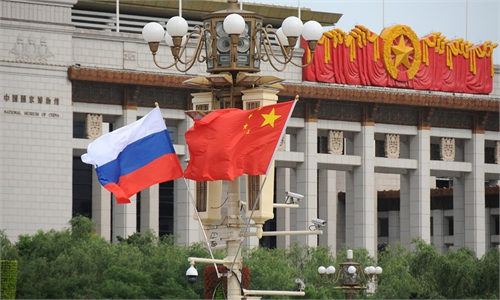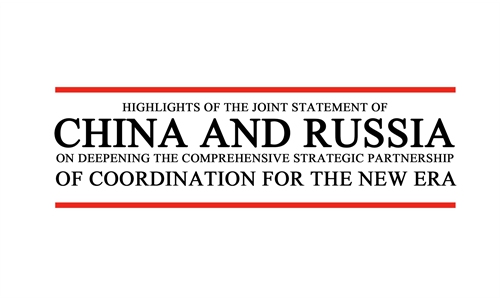
Illustration: Xia Qing/GT
Ten years ago, during his trip to Russia in March of 2013, Chinese President Xi Jinping gave a keynote speech at the Moscow State Institute of International Relations in Moscow, where he outlined the vision of "a community of common destiny in which everyone has in himself a little bit of others."
This vision reflected a deep conviction that no nation in the world can prosper and thrive when others suffer and stagnate, that no country should use its economic, political, or military power to dominate the international system, and that only by acting together in a good will, the mankind can move to a new inclusive, democratic, efficient and sustainable global order.
Ten years ago, a shared future for mankind looked like a natural and even an undisputable way to proceed. Economic globalization was still on the rise, the negative repercussions of the 2007-2008 global financial crisis notwithstanding. Great powers were generally willing to work hand in hand with each other on burning regional conflicts trying hard to reconcile their diverging interests. Moscow and Washington had concluded the New START in 2010 and demonstrated their commitment to proceed with the next steps in strategic arms control. There were reasonable expectations that concerted efforts of leading economies would result in further reductions of trade barriers, strengthening of multilateralism and reforming or upgrading of global international institutions - including WTO, IMF, IBRD, and the rest.
Unfortunately, over the last ten years, many of these trends were reversed, and many of earlier hopes and expectations were shattered. The world of 2023 is a much less hospitable, user-friendly place than the world of 2013 was. In many areas, the great powers' confrontation has replaced or side-lined the great powers' cooperation; many regional conflicts are purposefully fueled from the outside. The strategic arms control between US and Russia is almost nonexistent; the same can be said about the conventional arms control and military confidence-building measures. Political trust in international relations has become a clear deficit, while information wars have intensified like never before in this century. We observe fierce trade wars, multiple unilateral economic sanctions, and an accelerating fragmentation of what used to be the global economic system. The most important international institutions, including the UN Security Council, look paralyzed and incapacitated, and fundamental norms of international law are subject to politically loaded and biased interpretations.
In his public statements made in Moscow earlier this week, President Xi demonstrated his full allegiance to the principles he outlined ten years ago. Though nobody knows for sure what the future contains, I would venture to argue that the Chinese leader is right in his assessment and that the current disintegration/confrontation stage in the international system will not last for too long. There are a number of reasons for this conclusion.
First, the pressure of common challenges and threats will continue to grow. These challenges include climate change, resource crunch, biodiversity, transborder migrations, new pandemics, food security, cybercrime, and so on. Even if we have to put aside the goal to provide universal prosperity and global social justice for the time being, just in order to survive, the mankind will have to agree on a common vision and on joint actions in these and other similar areas.
Second, no responsible international actor could possibly be interested in endless military conflicts, in an uncontrolled arms race, in the rise of international terrorism, or in other negative developments that directly or indirectly increase the risks of a global great powers' clash or distract major material resources from addressing burning economic and social needs. That implies that major actors will have to get back to arms control, crises management, confidence-building measures, and, speaking more broadly - a common strategic culture. At this stage, it is hard to tell when exactly and in what specific form this takes place, but the instinct of self-preservation will ultimately prevail over the immediate political ambitions of short-sighted state leaders.
Third, so far, nobody has managed to stop technical progress, and the pace of this progress is only accelerating. Among other things, it means that the opportunities for various forms of transborder communication - including business, education, entertainment, social interaction, and the rest - will increase. So will the global geographical mobility. That means that mankind will have not only critical economic and political needs to move to a community with a shared future, but also the essential technical means to make such a move successful.
These days, it is much easier to be pessimistic about the future than to be optimistic about it. Still, one should not forget that the darkest hour is just before dawn. This might be the most important takeaway from President Xi's visit to Moscow. The deep crisis in global governance that mankind is going through now might result in fundamental changes in the international system, which many of us have been anticipating for such a long time.
The author is the Academic Director of the Russian International Affairs Council. opinion@globaltimes.com.cn




